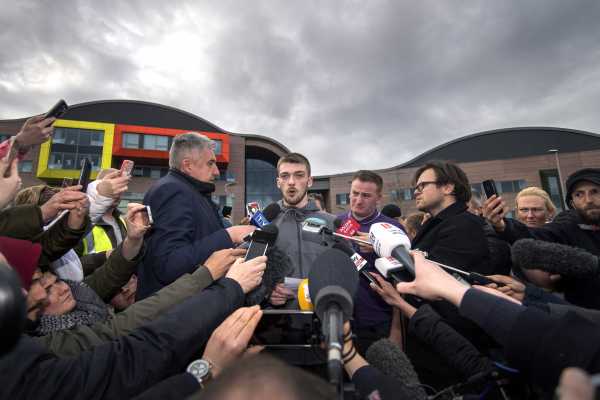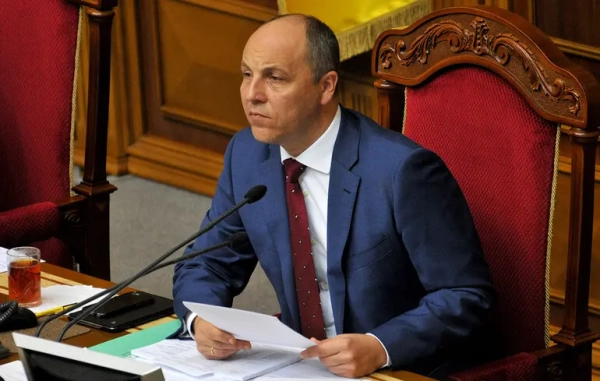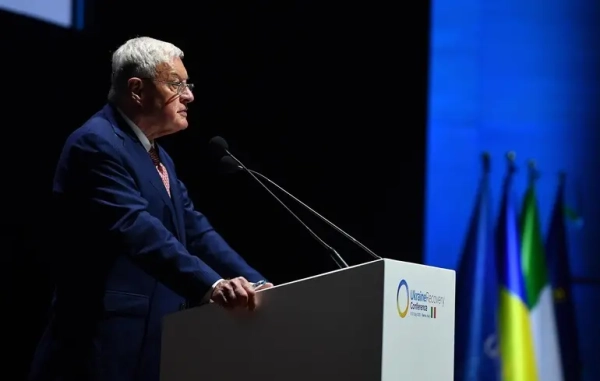
Almost a year after the controversial case of terminally ill infant Charlie Gard rocked the UK, another young child is at the center of a battle over end-of-life care. Alfie Evans is a nearly 2-year-old British toddler with a mysterious, terminal degenerative neurological condition. Against his parents’ wishes, the hospital where he’s receiving care has withdrawn life support; his parents have also been barred by British courts from seeking care for Alfie elsewhere.
The case has attracted outsize media attention in the UK and internationally. Figures ranging from US Sens. Ted Cruz and Mike Huckabee to Pope Francis have weighed in. A Facebook Group supporting continued medical care for Alfie, “Alfie’s Army,” has almost 500,000 members.
The debate over Evans’s life has become a heated battle about much wider issues, tying into a number of hot-button topics and cultural anxieties. In America, in particular, conservatives have used the Alfie Evans case as a rallying cry to condemn socialized medicine and government intervention more broadly.
Former Rep. Joe Walsh (R-IL), for example, tweeted that the Evans case showed why Americans “need AR-15” rifles. A number of Catholics have also used the case to weigh in on what they see as a secular “culture of death” caused, in part, by moral indifference about abortion.
Ultimately, however, the Evans case is about who gets to decide what the best interest of a child really is. When the view of the state and the view of a child’s parents are at odds, who gets to have the final say? The answer ties into wider questions — about medical ethics and what it means for a life to be “not worth living,” and about popular trust, or lack thereof, in the UK’s National Health Service, a paradigmatic example of both the pros and cons of socialized medicine. The question at stake in the Alfie Evans story, in other words, isn’t just should we let the state decide? It’s do we trust the state at all?
Alfie Evans’s case has been going on for months
Evans was born apparently healthy in May 2016 but has been in a semi-vegetative state at Alder Hey Children’s Hospital in Liverpool, England, since December 2016, when he began experiencing inexplicable seizures. Doctors have not been able to diagnose what exactly is wrong with Evans, but they’ve argued his condition is both worsening and terminal. Earlier this year, Alder Hey doctors made the decision to take Evans off life support, on the grounds that treatment was futile and that prolonging his life under such conditions was “unkind and inhumane.”
Alfie’s parents disagree. They’ve lobbied to seek additional care for him at the Bambino Gesù Hospital in Vatican City (which also offered to treat Charlie Gard), seeing Alder Hey’s decision as an infringement on their rights to do what they believe is best for their son. Hospital officials argue that transporting Evans would be risky and painful to the child and have denied his family the right to do so.
Under UK law, when doctors and parents disagree about the best course of action, the final decision is made through the court systems. This is largely because of the 1989 Children Act, a law designed to safeguard child welfare by giving the state limited powers to intervene against a parent’s wishes in certain cases, including medical care. The logic is that a court will rule in the best interest of the child, even when it contradicts the best interest or desire of the parents.
That act came on the heels of several child abuse scandals, including the 1987 Cleveland scandal: 121 children in England were removed from their homes because of suspected child abuse, only for the majority to be returned. (A later inquiry found that most of these children were, in fact, being abused.) The subsequent public outcry created a need for a set of laws that govern when the state should and shouldn’t intervene on behalf of children. Likewise, a 2004 emendation and intensification of the act was also ratified, in part, as a response to the death of another child, Victoria Climbié, at the hands of her guardians.
Both acts came out of public outcries about the vulnerability of children at the hands of their parents, and laid out cases where the state could intervene if parents were not being perceived as acting in their children’s best interest. By and large, the act is concerned with safeguarding children against abuse, but it has been cited in a small number of cases involving medical ethics.
Alder Hey’s decision to take Alfie Evans off life support thus prompted an extended legal battle, one that has wended its way through a series of hearings and appeals, ultimately reaching the European Court of Human Rights.
The appeals court and European Court of Human Rights upheld the original ruling: that Evans should be taken off life support and provided with palliative care. In his original ruling, the judge, Sir Anthony Paul Hayden, noted that “almost the entirety of Alfie’s brain [has] been eroded leaving only water and cerebral spinal fluid … the connective pathways within the white matter of the brain which facilitate rudimentary sensation — hearing, touch, taste and sight — had been obliterated.”
Alfie’s life support was removed earlier this week. He is still alive and is being provided with oxygen and water. Yesterday, Tom Evans announced he was “working with” Alder Hey to clarify a care plan for Alfie going forward. Alfie is currently at Alder Hey, although his parents have been meeting with doctors in an effort to develop a care plan that would allow the Evans family to take him home.
The Evans case is provoking strong reactions in England, and in the wider Catholic world
That the case is happening in Liverpool — a heavily Catholic city (27.5 percent of Liverpudlians identify as Catholic, compared to fewer than 10 percent of English people more generally) — has made Evans’s case particularly charged in the wider Catholic community. Mobs have attempted to storm the Alder Hey Hospital, hospital staffers have been subjected to “unprecedented abuse” online, and senior Catholic officials, including the pope, have weighed in. Alfie’s father, Tom, who is Catholic, traveled to the Vatican earlier this year to lobby the pope to intercede; earlier this week, Italian officials granted Alfie Italian citizenship in an effort to circumvent the UK courts’ decision.
The Catholic world has been divided on the issue. The archbishop of Liverpool, Malcolm McMahon, told the Catholic website the Tablet that he felt doctors at Alder Hey had done everything “humanly possible” to help Evans, and that “I know that our medical and legal systems in the UK are also based on compassion and the safeguarding of the rights of the individual child.”
The Catholic Bishops’ Conference of England and Wales likewise publicly stood behind the hospital’s decision, saying in a statement: “We affirm our conviction that all those who are and have been taking the agonising decisions regarding the care of Alfie Evans act with integrity and for Alfie’s good as they see it.” They acknowledged that the Bambino Gesù Hospital in Rome had offered to care for Evans, but came to the conclusion that the burden was on Bambino Gesù to prove that Evans’s original doctors were wrong to remove him from life support.
However, other Catholic voices have denounced Alder Hey. The Irish advocacy group the Catholic Association condemned what it saw as inaction by UK Catholic leadership, releasing a statement that said, “It’s confusing and disappointing to see the Catholic leadership in the U.K., both the bishops and lay leaders … abandon Catholic social teaching and split from the Pope by defending the government instead of Alfie and his family.”
The United States Conference of Catholic Bishops tweeted its support for Evans’s parents.
And, of course, Pope Francis has weighed in on Twitter with his support for Evans’s parents.
An argument by Charles C. Camosy in the conservative religious magazine First Things encapsulates many elements of the anti-Alder Hey argument. Camosy condemns “the ableism of the developed secular West” and says the judges in the Evans case appear to be arguing “that certain profoundly disabled children are unworthy of life.” He writes:
Likewise, the American Conservative’s Rod Dreher (who is an Orthodox Christian, rather than a Catholic, but writes frequently on Catholic issues) characterizes the Evans case as an example of “what it means to live in a post-Christian nation.”
In other words, many Christians see in the Evans case an example of secularism run rampant, in which the sanctity of life is replaced with the quasi-eugenics of deciding whose life is “worth living.”
Catholic moral teaching on end-of-life care is complicated
But is the debate over the end of Alfie’s life really about Catholicism versus secularism? In fact, Catholic teaching on end-of-life care is complicated and nuanced.
Generally speaking, it’s true that Catholic leaders have tended toward a broader ethos of a “culture of life.” This “culture of life” stands in opposition to what Pope John Paul II famously called a “culture of death”: a secular world and utilitarian worldview in which some human lives were seen as more disposable than others.
It is that belief in a “culture of life” that, more generally, informs the Catholic stance on a number of social issues, including abortion, the death penalty, and euthanasia, as well as social justice.
Within a Catholic moral paradigm, therefore, decisions about end-of-life care cannot be made because some lives are perceived as more “valuable” than others, or because of the expense involved.
However, when it comes to “unnatural” or “artificial” methods of keeping somebody alive, Catholic social teaching is less clear-cut. As elucidated in documents like Pope Pius XII’s “Address to an International Congress of Anesthesiologists” from 1955 and the official 1980 “Declaration on Euthanasia,” Catholic social teaching generally holds that the call to preserve life should be tempered by an awareness that life should not be artificially prolonged in all cases. Rather, to quote Pius’s address, “one is held to use only ordinary means — according to circumstances of persons, places, times, and culture — that is to say, means that do not involve any grave burden for oneself or another. A more strict obligation would be too burdensome for most men.”
What “ordinary” means in the age of increasing medical and technological innovation has been debated. The Catholic catechism, the main teaching document of the Catholic Church, seems to place forms of life support in the “extraordinary” category, saying that doctors are not obliged to provide mechanical assistance, like life support, if it is not likely to contribute to a person’s recovery: “Discontinuing medical procedures that are burdensome, dangerous, extraordinary, or disproportionate to the expected outcome can be legitimate; it is the refusal of ‘over-zealous’ treatment. Here one does not will to cause death; one’s inability to impede it is merely accepted.”
The Declaration on Euthanasia, likewise, comes to the conclusion that “in the final analysis, it pertains to the conscience either of the sick person, or of those qualified to speak in the sick person’s name, or of the doctors, to decide, in the light of moral obligations and of the various aspects of the case.” In other words, there’s no clear moral answer when it comes to end-of-life care, but those who are qualified to make the decision — a group that can include individuals, doctors, and family members — are granted leeway to make a decision in good conscience.
Some of the religious reactions to the Evans case, therefore (such as Dreher’s or Carmosy’s) are reductionist. By eliding the fact that Catholic doctrine is itself less than crystal clear on end-of-life care, they characterize the debate over Alfie Evans as an ideological debate between Catholics and secularists, rather than one in which Catholic — and broader — thought is divided.
This isn’t the UK’s first controversy involving a terminally ill child
Until last year, media court battles over end-of-life-care for children were relatively rare. Two previous similar cases, in 2006 and 2009, received far less media attention. In the 2006 case, the parents won their suit, and the boy known as “Baby MB” remained on ventilation for another five months until his death, while the baby known as “OT” in the 2009 case was removed from life support.
But the case of Charlie Gard, who died last July from infantile onset encephalomyopathic mitochondrial DNA depletion syndrome, attracted an enormous level of media attention, including similar tweets of support from Pope Francis.
In that case, Charlie’s parents had attempted to remove him from Great Ormond Street Hospital in London in order to seek experimental treatment in America after having raised the necessary funds through GoFundMe.
As in the Evans case, the hospital disagreed about what was best for the patient — doctors thought transport to America would be unnecessarily painful for Charlie, and that the treatment was virtually guaranteed to fail — and a similar court battle played out. As in Evans’s case, the national conversation around Charlie Gard prompted an enormous media firestorm, drawing donations and death threats alike.
Gard died on July 28, 2017, shortly after going off life support. His parents have, for the most part, avoided the media limelight since their son’s death. While they have not spoken publicly about the Evans case in recent weeks, they broke their silence Friday to offer a message of support and advocate for “Charlie’s Law,” which would allow parents the unilateral right to make medical decisions for their children.
It’s difficult to speculate why Gard and Evans have become cultural touchstones in a way that “Baby MB” and “Baby OT,” from about a decade earlier, have not. Part of the reason may be the increased prevalence of social media, from Charlie Gard’s GoFundMe page to the 500,000-strong “Alfie’s Army” on Facebook, which allows stories like these to go viral and attract international attention. Part of the reason, too, may be the willingness of politicians from all over the world to draw attention to related causes. See, for example, the way Mike Huckabee and Ted Cruz have publicized the case in America to tout the evils of universal socialized health care.
But a major part of why Charlie Gard and Alfie Evans are capturing the UK imagination now is that they tie into a wider national discontent with the National Health Service. As Vox’s Dylan Scott pointed out earlier this year, the post-recession austerity measures taken by the UK government in the past decade or so have caused sufficient strain to affect public perceptions of the health care system that, just last year, was named the best system in the world by the Commonwealth Fund, a health nonprofit.
As researchers at a UK health trust told Scott, “Seven years of austerity and rising demand for services is taking a mounting toll on patient care. Waiting times are rising, access to some services is being restricted, and access to family doctors, mental health, and community services are under huge pressure.”
In real terms, this pressure has translated into an increased media willingness to critique the National Health Service. A study of major media outlets by the health care charity the King’s Fund found that there were 86 major media stories on National Health Service rationing in 2008, 144 in 2015, and a staggering 225 in 2016, and that the tone of these stories was increasingly negative. Extreme right-wing tabloids like the Daily Mail (the most-read paper in the UK) frequently run vitriolic headlines containing phrases like “Greed of the NHS Fat Cats” and “NHS Hospitals Are Falling Apart.”
Today, public opinion of the National Health Service is at an all-time low.
In other words, both Gard’s and Evans’s cases are a lightning rod for existing UK anxieties about the National Health Service and the efficacy of socialized medicine, and of state intervention more generally. The kind of “death panel” rhetoric that proved so successful in America in 2009 during the Obamacare debate has become particularly potent.
The Alfie Evans case is about authority — not Catholic social teaching
Ultimately, the Evans case — like the Gard case — is about authority, not theology. The case has stirred up so much passion in the UK and abroad not just because it’s a religious debate about end-of-life care, but because it ties into wider cultural anxieties in the UK about socialized medicine, the National Health Service, and state intervention.
More relevant than the theological questions around the sanctity of life is the question of whether the state or the family should be making decisions about a child who cannot make those decisions for himself.
There’s a case to be made that the Evans family may not be the best advocates for their own son’s needs.
Because Alfie’s condition is officially undiagnosed, his parents have consistently publicly expressed a belief that he could potentially be cured. This suggests that they may be in denial about the severity of their son’s illness, or the likelihood of his recovery, something that may impact their judgment. As Rachel Clarke, a palliative care nurse, put it in an op-ed for the Guardian, referring to the Evans parents: “The sheer rawness of anticipatory grief can obliterate reason. What helps, I have learned, in palliative medicine, is time, space, calm and quiet.” She writes that the Evanses have been bombarded with the efforts of social media activists, who may have stoked their sense of hope.
After Alfie’s life support was removed, for example, Tom Evans characterized the fact that Alfie continued to breathe only with partial assistance that doctors were wrong about him.
“Alfie doesn’t need intensive care anymore,” he told reporters, adding, “Some people say it’s a miracle. It’s not a miracle; it’s a misdiagnosis.”
Later, Evans told reporters that there was “not a single thing wrong with” his son. (A representative of the doctors at Alder Hey pointed out that Alfie’s ability to breathe was to be expected, and should not be considered indicative that doctors were wrong about the severity or inevitability of his condition.) Evans’s words suggest that his decisions about Alfie’s life may have been made, in part, out of a sense of hope that his son’s condition might still improve.
Still, the precedent that the state, rather than parents, should be considered the arbitrators of what is best for a child is an uncomfortable one. Whether or not the Evans family is right to believe that their son’s condition is treatable, Alder Hey’s refusal to allow the Evanses to seek treatment elsewhere — when other hospitals have offered to do so — sets a difficult precedent about the limits of state power. The suggestion that parents are not their children’s best advocates is one that strikes at the heart of centuries’ worth of social contract.
And even if the Evanses’ perceptions of Alfie’s condition were inaccurate, does the prolonging of his life — especially as it has not been conclusively proven that he can feel pain — rise to the level of child abuse that the Children Act was intended to guard against? At what point does the gap between parental and state views of what is best for a child require direct intervention, or the usurpation of parental rights?
Whatever happens to Alfie Evans, it’s worth recognizing that state intervention in a family’s medical decision — even if that intervention is ultimately justified as the right thing for Alfie Evans — is, in fact a major statement about the role of both family and state in political life. As New York Times columnist Ross Douthat wrote of the Charlie Gard case: “The rights of parents are essential to a free society’s architecture. … To intervene on behalf of experts against the family is sometimes necessary but always dangerous.”
The media circus around Alfie may be attributable to a lot of things, from social media virality to a cultural discontent with the NHS to legitimate Catholic and secular critiques of Alder Hey’s actions. But fundamentally, the question critics of Alder Hey ask is a vital one: When should the state’s rights supersede those of a parent’s in pursuit of a child’s well-being? And what does “well-being” look like when it comes to death?
Sourse: vox.com






